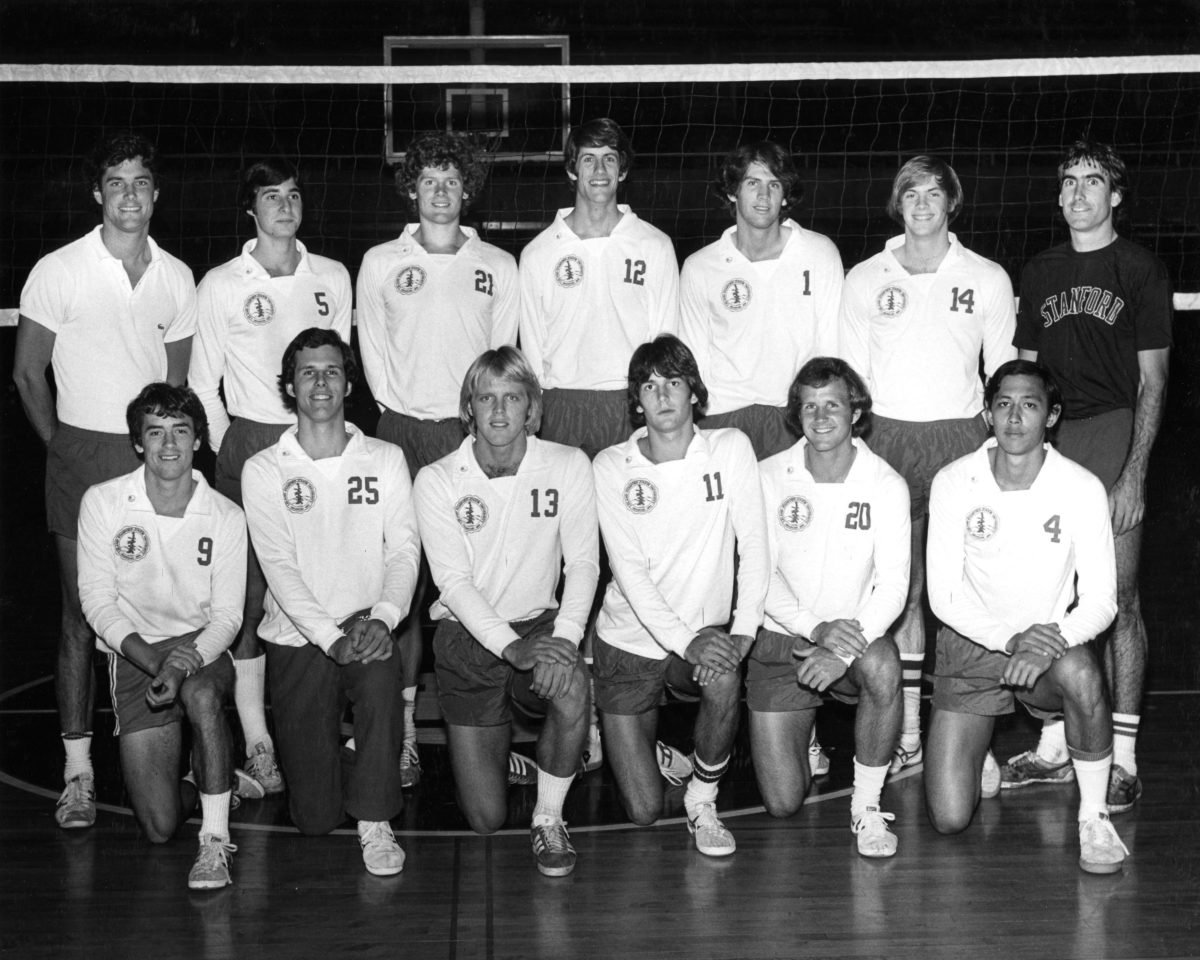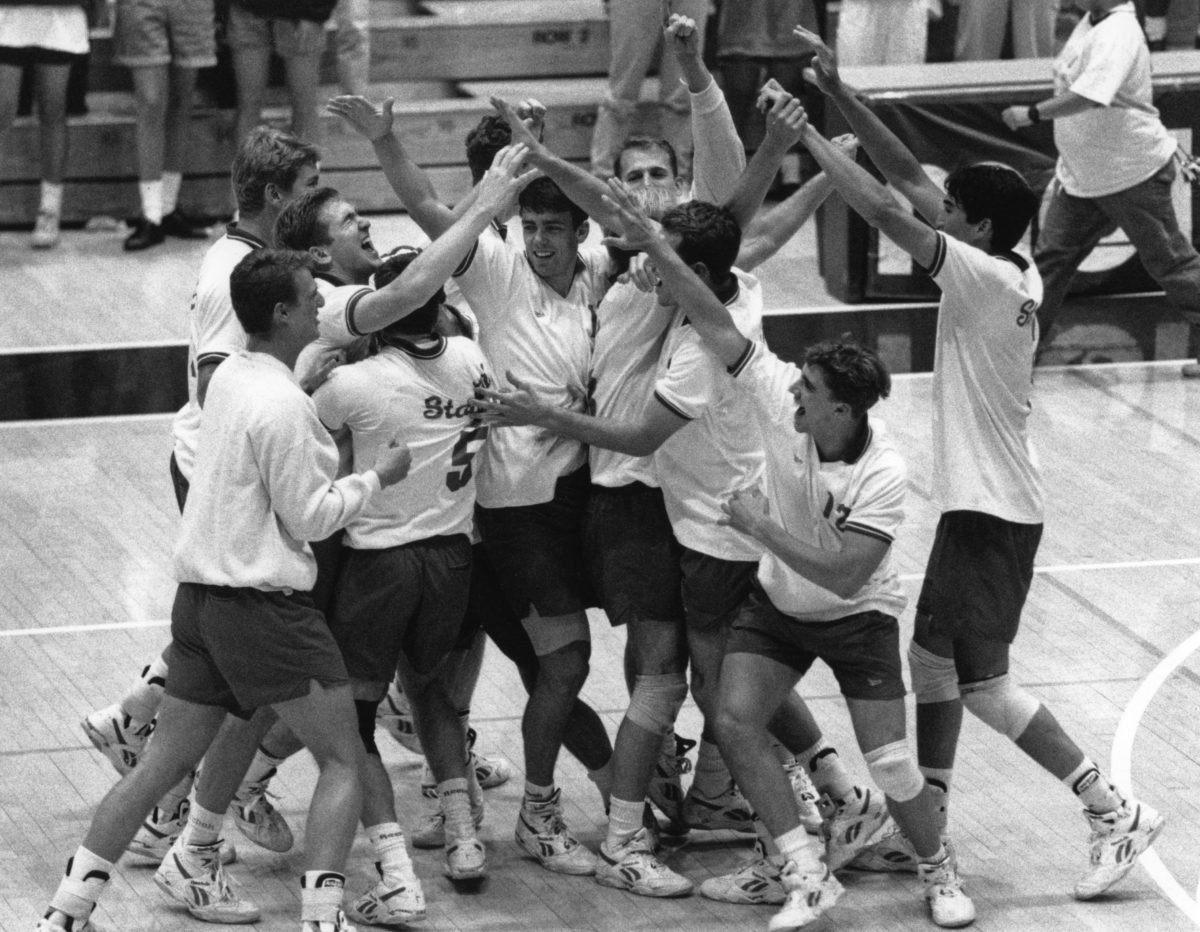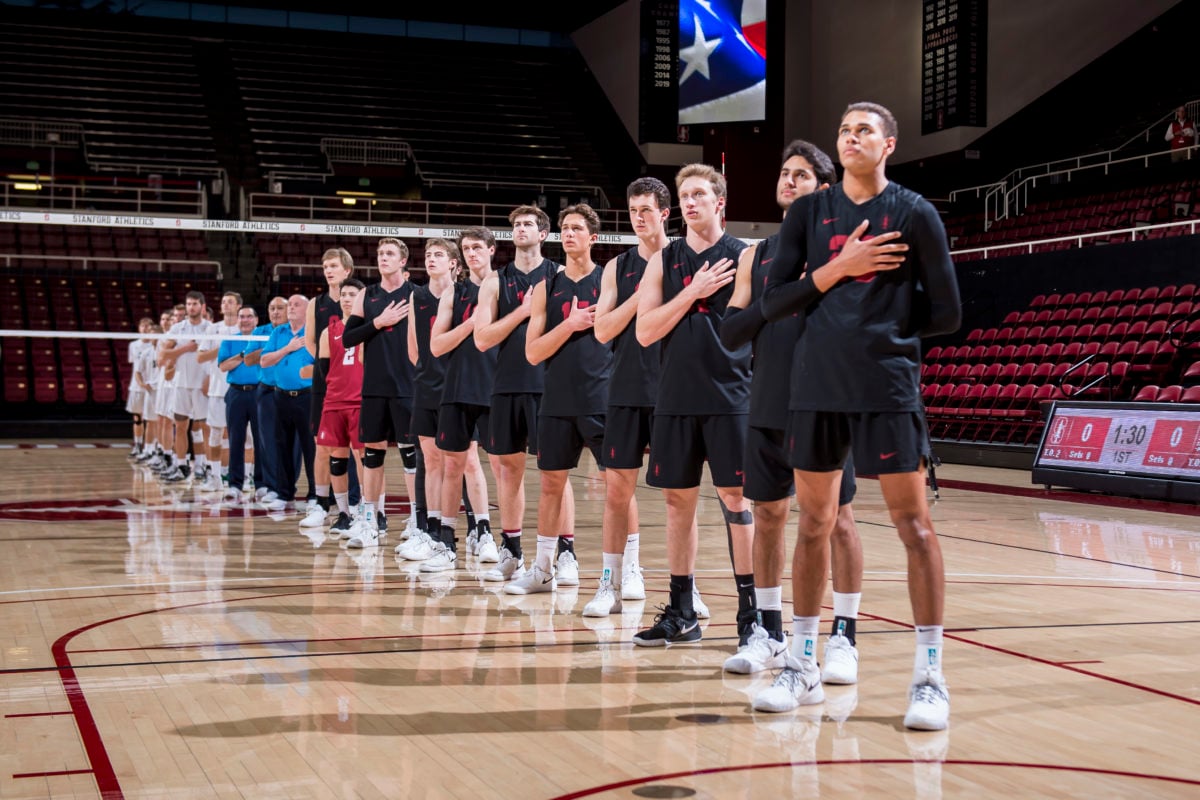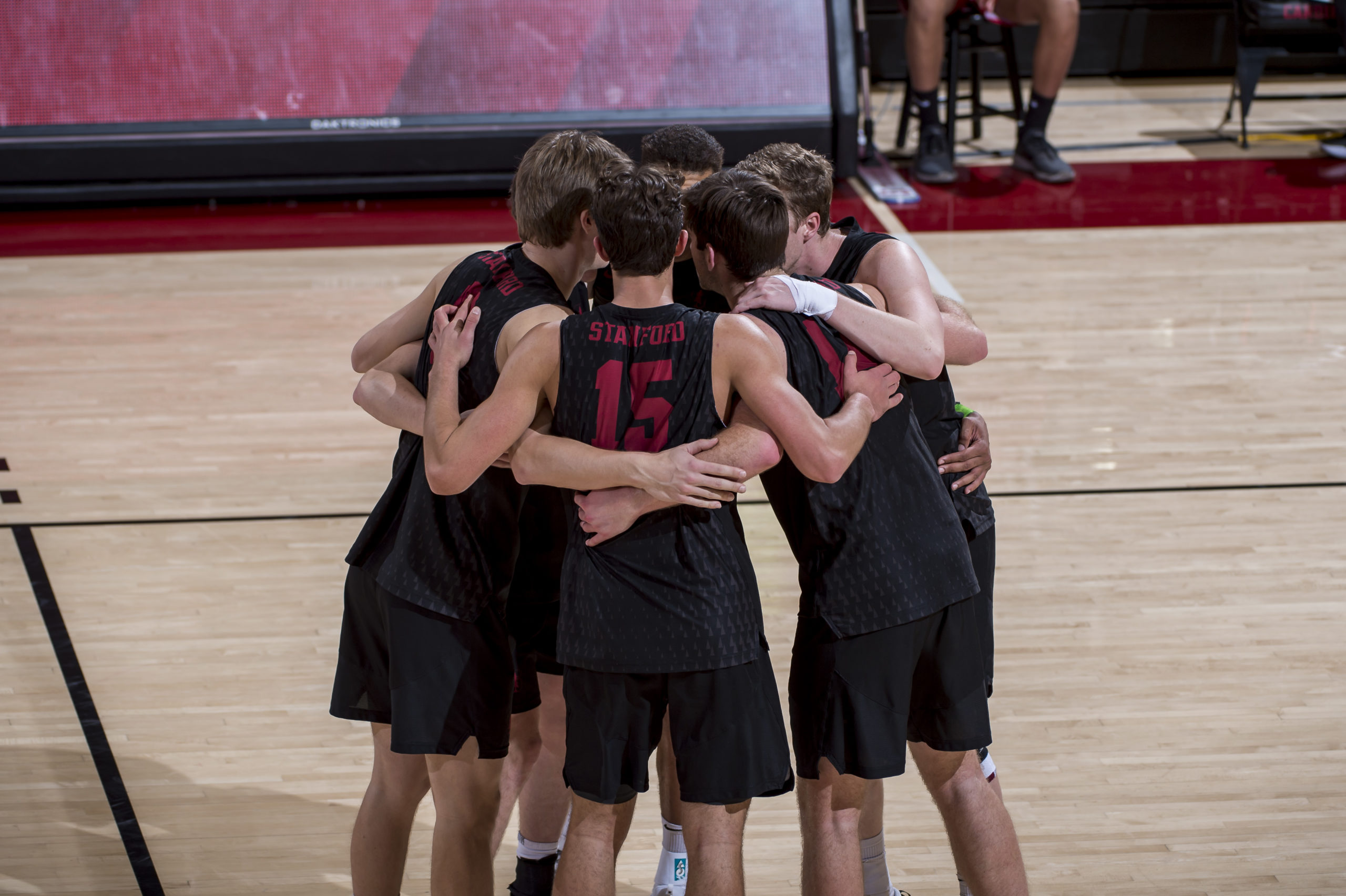“Game Point” is a series documenting the reactions of men’s volleyball players and alumni to the July 8 announcement that Stanford Athletics would discontinue 11 varsity programs, including the men’s volleyball team, following the 2020-21 season. The articles endeavor to share efforts to save the team and the broader implications — collegiately, nationally and internationally — of the abrupt decision.
In volleyball it’s often hard to distinguish the middle of a game from its end. Three times during the 2020 season, the Stanford men’s team found itself down 0-2 entering the third set, where it was win or go home. Give up 25 points and the Cardinal fall, but often Stanford has rallied to come back from the seeming brink of extinction to leave victorious.
Now confronted with the unexpected news that their team will be cut following the 2021 season, the team’s mentality is no different. Cardinal past, present and future are bringing the same third-set, must-win mindset to saving their beloved program.
Just a few hours after Stanford Athletics released its plan to cut varsity men’s volleyball, incoming freshman outsider hitter Kupono Browne started an online petition to save the program. He hadn’t even put a Cardinal jersey on yet.
“As soon as I heard about the news, the first things that came into my mind were we need to get the word out and the best way to do that might be to start one of these petitions on Change.org,” the Honolulu native said. “I’ve seen a lot of Black Lives Matter Movement petitions online, as well as a petition that was more local concerning the Molokini Crater.”
Browne’s petition took off and has since garnered over 27,000 signatures, as of the time of publication; for perspective, that’s nearly four times Stanford’s undergraduate enrollment.
“I took it upon myself to set that up and read a little bit of background for the written portion of the petition to get that going as soon as possible and post that everywhere I possibly could,” he said. “I’m really glad that took off. It’s looking good right now — but the more signatures we can get, the better.”
Breaking the News
Although Browne was the first to take action online, he was the last team member to hear about Stanford’s decision.
The men’s volleyball team was initially notified of the University’s intended cancellations through a Zoom webinar with all 11 affected teams. The athletic department’s email invitation to coaches and players, however, preceded the 9:45 a.m. PT call by just 35 minutes — so many Hawaiians, including Browne, were still asleep.
Browne only found out about the news from his mother when he woke up three hours later.
“I remember feeling super shocked,” the ‘Iolani High School alum said. “I felt completely blindsided, and it was rough to go through.”

Six hours ahead in Maryland, rising senior opposite Jaylen Jasper was equally surprised. He was out to brunch with his parents when he got an email from Athletic Director Bernard Muir about “a time-sensitive meeting regarding athletics.” Jasper, the three-time AVCA All-America honorable mention said that the email urged “as many people” to attend as possible, but Jasper didn’t think it was anything out of the ordinary until logging on to Zoom.
“I didn’t think of reaching out to anyone else or any other teams to see if they got it,” he said. “I just thought it would be about if we were allowed to come back to campus or not.”
Once Jasper noticed he couldn’t see his teammates, only Muir sitting silently, he knew something was wrong. When Muir acknowledged there were 11 teams on the call, not just men’s volleyball as Jasper had initially assumed, more red flags went up.
“Then [Muir] said, ‘2021 school-year,’ and he used the word ‘discontinued,’ Jasper said. “That’s when everything went mute. I was looking at this man, speaking to me through my computer, but nothing was registering.”
The only way he could describe it: “heartbreaking.”
An email to athletic donors followed the Zoom call with affected athletes, and a press release from the athletic department came a few minutes later to all community members.
James Shaw ’16 was training at home in Northern California when his mom walked in with tears in her eyes after reading the email-announcement.
“I knew something was wrong,” the Team USA setter said. “Honestly, since then I’ve just been in shock. It hasn’t really hit me yet. Still processing, still in shock.”
Shaw, the 2016 MPSF Player of the Year and Lloy Ball Award winner, started for the Cardinal for four years — but his Stanford roots run even deeper. His father, Don Shaw, coached both the men’s and women’s teams at Stanford for a combined 27 years starting in 1984.
The news forced the younger Shaw to reevaluate his own relationship with Stanford. Almost all of his childhood memories revolve around the program; he grew up in the practice gym, watching men’s and women’s games and playing with his sister in the hallways of Burnham Pavilion. As a coach’s son, Shaw emphasized that growing up with Cardinal volleyball players and staff heavily shaped the person he is today.
“It feels like a piece of me has been ripped out by the place that I love and that I call home,” he said.
Recently relocated to Texas, Brad Lawson ’12 heard the news through a Stanford team group chat that’s been in use for a decade.
“When I saw the news and started to see people’s reactions, I was first of all shocked,” the three-time AVCA first-team All-American outside hitter said. “This cannot be happening. There’s a little bit of denial just because the program has been around for so long and has been so successful over the years. We’ve produced so many Olympians, and we’ve had two national championships. We’re just consistently competing at the highest level.”
Fellow 2010 NCAA national championship winner Erik Shoji ’12 found out when he woke up in Hawai’i to 40 messages in the same group chat.
“It just came as a complete shock,” the Olympic-bronze-medal-winning libero said. “I had no idea that this was coming. I think due to COVID we all might understand that financial cuts are going to happen, but we just were completely blindsided. It was just honestly devastating.”
“I felt like I’ve been punched in the gut,” Chris McLachlin ’68, M.Ed. ’70 said. “I’ve obviously invested a lot in the program, having been a player, having been a parent of a student-athlete [Spencer McLachlin ’11], and then having been a coach on two different occasions — once when I was at Stanford and then once later on, I volunteered in 2010 and 11.”
Chris McLachlin, who Shaw referred to as the “Godfather” of Stanford volleyball, has been part of the program since before it became an NCAA sport in 1976.
“A Slap in the Face”
For many players past and present, it wasn’t solely the impending cancellation that caught them off guard. The manner of delivery and lack of warning was described by one current player as “the ultimate slap in the face.”
“It just didn’t seem like they made a decision that included the opinions of current and former players and alumni,” Lawson, who played professionally in Europe for three seasons, said. “We didn’t feel like we were being taken into account at all.”
In its statement, Stanford Athletics wrote that “financial model supporting 36 varsity sports is not sustainable” and cut the men’s volleyball program due to a financial deficit, among other factors.

According to Stanford’s administrative biographies, none of the department’s top staff have any background playing or coaching men’s volleyball.
A few hours after the announcement webinar, the 2020-21 men’s team reconvened on Zoom in what was originally planned to be a meeting to relay critical information about reporting to on-campus training. Instead, head coach John Kosty texted the players that the meeting’s focus was now addressing the cancellation.
On the Zoom call, the team and staff were joined by an executive associate athletics director, who was tasked with answering team questions, but many players quickly became frustrated.
“We got very little sympathy,” Jasper said after the administrator stressed that the decision was final.
The role of athletics within the greater University was downplayed, and a player recalled being told, “You’re a priority, but you’re not the top priority.”
Another current player felt that the athletics department “cares about their reputation and money” more than students.
“I want the spreadsheets,” he said. “I want the numbers. I want to see if they really tried to make things work.”
Although promised one final season, many questions still remain. For starters, players still do not know when or if they will return to campus for preseason workouts. Game schedules will likely be reshuffled, as seen nationwide with football, and no one knows if fans will fill Maples Pavilion any time soon.
Although Jasper will enter the 2020-21 school year academically as a senior, he has two years of remaining eligibility since his 2019-20 season was cut short due to COVID-19. With an extra year of NCAA volleyball, Jasper had originally intended to co-term and complete a double major in Psychology and Political Science. He’s not too sure what the future holds now that there is only one year of varsity play guaranteed.
“I’m not going to forfeit the degree I’ve worked so hard for, but being an athlete was such a part of my time at Stanford and my identity,” he said. “When it hit me that that’s not going to be there anymore, it’s crushing.”
“The first thing I thought was I can’t even imagine what the current players are feeling,” Shaw said. “That’s their current situation, their current status. They don’t know what to do with the rest of their college career. Obviously, we’re going to fight it as much as we can. But yeah, I felt for those guys immediately.”
Signatures, hashtags and donations
And the fight certainly has begun.
Browne’s petition prompted a wave of online activism to save the program, including Instagram posts from Team USA, which has over 21,000 followers worldwide. The national team’s bio now includes a link to Browne’s petition, and USA reposted messages from Jasper, Shaw and Shoji.
“It’s pretty impressive,” McLachlin said. “There’s been reach-outs from across the volleyball community — either condolences or ‘what can I do to help this fight.’ The volleyball community is pretty tight.”
Players claim that the athletic department has cut off access to the official, Stanford-run Instagram, which hasn’t posted since July 7, but that hasn’t stopped the conversation. @SaveStanfordMVB started the hashtag, #NextStartsWhenYouReinstateOurProgram — an ironic spin on the “Next Starts Now” motto used by Stanford Athletics to market the 2019-20 athletic calendar.
Despite being scattered across the globe, over 100 alumni have also convened online numerous times in the past week to brainstorm how to save the program.
“We’re not going to go down with a fight,” Shoji said. “All the alumni are working tirelessly at this, no matter where we are in our lives and what kind of experience we’ve had with this program. We’re going to fight this. We’re going to come together, and it’s a beautiful thing. So I just hope that Stanford can hear us and listen and hopefully reverse the decision.”

“Not trying to leave any doors open,” Shaw said of the alumni efforts.
Cutting sports is not a new phenomenon, and neither is their reinstatement. As Shaw noted, UC Berkeley tried to cut baseball, but the team was reinstated in 2011 after successful fundraising efforts; at the time, current Stanford Baseball Head Coach David Esquer led the Golden Bears.
Stanford Athletics, however, maintains that any future donations to terminated teams “may be directed towards supporting them at the club level, should they establish as a club sport after their 2020-21 varsity campaign.”
“They’re doing what they can to make sure that their decision sticks; that’s what their job is,” Shaw said. “All we can do at this point now is to hope that we can come up with enough support, financially and otherwise, to change their mind. In our opinion, on our side of things, we want to believe that ‘nothing is [certain] other than death and taxes.’ We want to fight the decision because we think there’s always a chance and it’s worth fighting for.”
Contact Cybele Zhang at cybelez ‘at’ stanford.edu.
